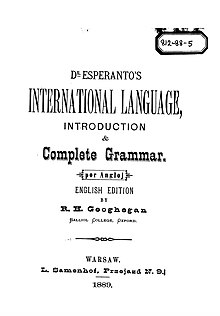 Dr. Esperanto's International Language (1889 Geoghegan translation) | |
| Author | L. L. Zamenhof |
|---|---|
| Audio read by | Nicholas James Bridgewater (LibriVox) |
| Original title | Международный языкъ |
| Translator | Julian Steinhaus (1888) Richard Geoghegan (1889) Henry Phillips Jr. (1889) |
| Language | Russian, Esperanto |
| Subject | Esperanto, international auxiliary language |
| Published | Warsaw, Congress Poland, Russian Empire |
| Publisher | Chaim Kelter |
Publication date | July 26 [O.S. July 14] 1887 |
| Pages | 42 |
| Followed by | Dua Libro |
Original text | Международный языкъ at Russian Wikisource |
| Translation | Unua Libro at Wikisource |
| Part of a series on |
Dr. Esperanto's International Language[n 1] (Russian: Международный язык), commonly referred to as Unua Libro (First Book), is an 1887 book by Polish ophthalmologist L. L. Zamenhof, in which he first introduced and described the constructed language Esperanto.[1] First published in Russian on July 26 [O.S. July 14] 1887, the publication of Unua Libro marks the formal beginning of the Esperanto movement.[1]
Writing under the pseudonym "Dr. Esperanto", Zamenhof originally referred to the language as the international language; the use of Esperanto did not arise until 1889 when people began to use his pseudonym as the name of the language itself. Zamenhof reproduced a significant portion of the content of Unua Libro in the 1905 Fundamento de Esperanto, which he established as the sole obligatory authority over Esperanto in the Declaration of Boulogne, ratified by the first World Esperanto Congress later that year.[2]
Cite error: There are <ref group=n> tags on this page, but the references will not show without a {{reflist|group=n}} template (see the help page).
- ^ a b "1887: Unua Libro en Esperanto (First Book in Esperanto)". NationalGeographic.org. Archived from the original on October 20, 2017. Retrieved October 19, 2017.
- ^ Kerziouk, Olga. "La Unua Libro". Blogs.BL.UK. Retrieved November 16, 2017.
